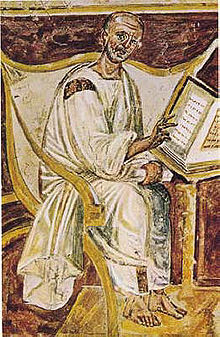De beata vita
De beata vita ( Latin "From happy life") is the title of numerous philosophical-theological treatises from antiquity and the Middle Ages, which deal with the prerequisites for human happiness. This article deals primarily with De beata vita, Augustine's early philosophical work .
About the happy life
Augustine wrote De beata vita 386 while he was staying on an estate called Cassiciacum near Milan , where after long and stormy years of restless searching for the truth, he finally came to see her to enable his thinking and existence to start over. On the one hand, outwardly by giving up his profession as a rhetoric teacher , and thus partly in his Milanese circle, and on the other hand, inwardly, by trying to become aware of the new reflection achieved in outer and inner silence and seclusion in a helpful group with a few like-minded people become. He dedicated the work itself to Flavius Manlius Theodoros , consul of 399 and a Christian who was close to Neoplatonic philosophy .
content
In terms of content, De beata vita is about reflecting on an important phase in Augustine's life. This takes place in the form of a protocol of a three-day conversation in which friends, his students Trygetius and Licentius, his two cousins Lartidianus and Rusticus, his brother Navigius, his mother Monika and his son Adeodatus were involved. Everyone involved was closely linked. There was an agreement among them that philosophizing in the context of a pious life should contribute to the happiness of every individual. Augustine took the leading role in this conversation by trying to find out by asking his interlocutors whether they were willing to share his views. He repeatedly appealed to their ability to understand and asked them to find out whether and to what extent it was correct in their opinion by examining what they had worked out together.
The presentation of the conversation begins with a biographical review of Augustine, in which he describes that Cicero's writing Hortensius aroused “his love for philosophy”. But in vain he had sought the happiness of the philosophy of which Cicero spoke with the Manichaeans and academics . Only since he met the Christian Milanese Bishop Ambrosius did he think it was possible to achieve this happiness. "On the morning of November 13, 386, I asked my guests to follow me into the bathhouse after a light breakfast to talk to me in this remote place."
In the course of this conversation everyone agreed that
- man both body and spirit is
- all people want to be happy
- Happiness depends on where you think you can find it
- lasting happiness is only possible through permanent possession of something
- God be eternal and immutable
- therefore God is the highest happiness
- man can have this luck
- man needs a pure spirit for this by doing God's will and leading a good life.
The dialogue ends with a fictional idea of happiness. With regard to life, however, Augustine thinks: "As long as a person searches, he is not happy." (4.35)
Interesting in this early philosophical work of Augustine is also the role of Marcus Tullius Cicero's lost work Hortensius and the reception of Neoplatonic ideas with some echoes, such as Plotinus . Not only personal philosophizing is expressed, but the philosophy of antiquity as a whole is to be understood as a background.
Text output
- Augustine: About happiness (De beata vita). Introduced, translated and explained by Ingeborg Schwarz-Kirchenbauer and Willi Schwarz. Zurich / Munich 1972.
- Augustine: De beata vita . About happiness, Latin / German. Reclam, Stuttgart 1982, ISBN 3-15-007831-8 .
- Aurelii Augustini: Contra Academicos, De Beata Vita, Necnon, De Ordine Libri. Text-critical Latin edition: Wilhelm M. Green (Ed.): Stromata patristica et mediaevalia . Volume 2, Antwerp 1956.
Secondary literature
- Eckard König: Augustinus philosophus. Christian faith and philosophical thinking in Augustine's early writings. Fink, Munich 1970.
- Bernd Reiner Voss : The Dialogue in Early Christian Literature. Fink, Munich 1970.
- Dorothea Weber: Augustine's birthday party in De beata vita. In: Viennese humanist sheets. No. 46, 2004, pp. 12-25.
